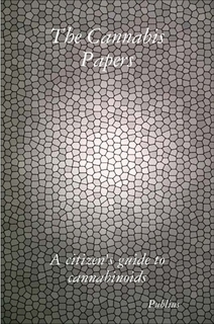 The Cannabis Papers by Publius (2011)
The Cannabis Papers by Publius (2011) The Cannabis Papers: A citizen’s guide to cannabinoids (2011)
By Publius
Keith Marker / PTSD Edition
Publius’ Veterans Day cannabinoid science PTSD edition notes four 2014 PubMed articles on the cannabinoid system (CS) modulating re-homeostasis, our ability to heal. Today’s Re-Homeostatic line-up links to CS PubMed articles discussing: brain injury combined with depression, diet and PTSD cues, facilitating fear extinction (and its recall), and a music therapist for World War I Shell Shock, Paula Lind Ayers.
 Keith Marker, Albuquerque, NM, US Military Veteran
Keith Marker, Albuquerque, NM, US Military Veteran With healing in mind, we highlight and honor US veteran Keith Marker; Marker served in Afghanistan, suffered suicidal PTSD upon returning home, and found CS relief via New Mexico’s Medical Cannabis Program.
I. Re-Homeostasis (Brain Injury and PTSD) and the CS
“United States Veterans of the Iraqi (Operation Iraqi Freedom (OIF)) and Afghanistan (Operation Enduring Freedom (OEF)) conflicts have frequently returned from deployment after sustaining mild traumatic brain injury (mTBI) and enduring stressful events resulting in posttraumatic stress disorder (PTSD). A large number of returning servicemembers have been diagnosed with both a history of mTBI and current PTSD. … These findings suggest Veterans with mTBI+PTSD perform significantly lower on neuropsychological and psychiatric measures than Veterans with mTBI-o or PTSD-o. The results also raise the possibility of persisting cognitive changes following mTBI sustained during deployment.”
The Effects of Mild TBI, PTSD, and Combined Mild TBI/PTSD on Returning Veterans.
Combs HL, Berry DT, Pape TL, Babcock-Parziale J, Smith B, Schleenbaker R, Shandera-Ochsner A, High WM.
J Neurotrauma. 2014 Oct 28. [Epub ahead of print]
PMID: 25350012 [PubMed - as supplied by publisher]
Related citations
II. Re-Homeostasis (via Diet) and the CS
“The etiology and pathophysiology of post traumatic stress disorder (PTSD) remains poorly understood. The nutritional deficiencies associated with the altered metabolic processes of PTSD have not previously been studied in detail. … The results of this initial study demonstrate that addressing the increased dietary requirements of PTSD can improve symptoms of the disease while eliminating significant side effects. A larger, double-blind, randomized, placebo-controlled trial is warranted.”
Administration of an amino Acid-based regimen for the management of autonomic nervous system dysfunction related to combat-induced illness.
Shell WE, Charuvastra M, Breitstein M, Pavlik SL, Charuvastra A, May L, Silver DS.
J Cent Nerv Syst Dis. 2014 Oct 8;6:93-8. doi: 10.4137/JCNSD.S13793. eCollection 2014.
PMID: 25336998 [PubMed] Free PMC Article
Related citations
III. Re-Homeostasis (Anxiety Disorders/Fear) and the CS
“Anxiety disorders, such as post-traumatic stress (PTSD), panic, and phobic disorders, can be conceptualized as a failure to inhibit inappropriate fear responses. … How might the cannabinoid system effect fear extinction? Collectively, translational evidence suggest that enhancing cannabinoid transmission may facilitate extinction learning and its recall, and that the cannabinoid system is a potential pharmacological target for improving the active learning that occurs during exposure-based behavioral treatments prompting future research in terms of mechanisms research, novel treatment approaches ('cognitive enhancers'), and pharmacotherapeutic drug discovery.”
Cannabinoid modulation of fear extinction brain circuits: a novel target to advance anxiety treatment.
Rabinak CA, Phan KL.
Curr Pharm Des. 2014;20(13):2212-7.
PMID: 23829364 [PubMed - in process]
Related citations
IV. Re-Homeostasis (Music Therapy/Shell Shock) and the CS
“Little is known about the therapeutic uses of music during the First World War. This historical study provides a biography of Paula Lind Ayers (1891-1974), a vocalist, actress, and YMCA Entertainer who became known as ‘the girl who could sing away shell shock.’ … Understanding Paula Lind Ayers' contribution to music therapy provides a deeper awareness of past therapeutic uses of music with soldiers who experienced shell shock. Such understanding helps shape the way we view the present conception of music therapy with veterans and how we might answer questions that will affect the future of the field.”
Paula Lind Ayers: "song-physician" for troops with shell shock during World War I.
Reschke-Hernandez AE.
J Music Ther. 2014 Fall;51(3):276-91. doi: 10.1093/jmt/thu022.
PMID: 25316916 [PubMed - in process]
Related citations
*Publius thanks Otto Snow for the science reports on PTSD and, especially, for the Keith Marker story.
~
*Ew Publishing’s Veterans Day Run continues tomorrow (Monday 10 November), with a review of Muhammad Ali’s greatest fight, Cassius Clay v. United States, by William Abens on the BWB Blog.
~
Posted by Bryan W. Brickner
 RSS Feed
RSS Feed
